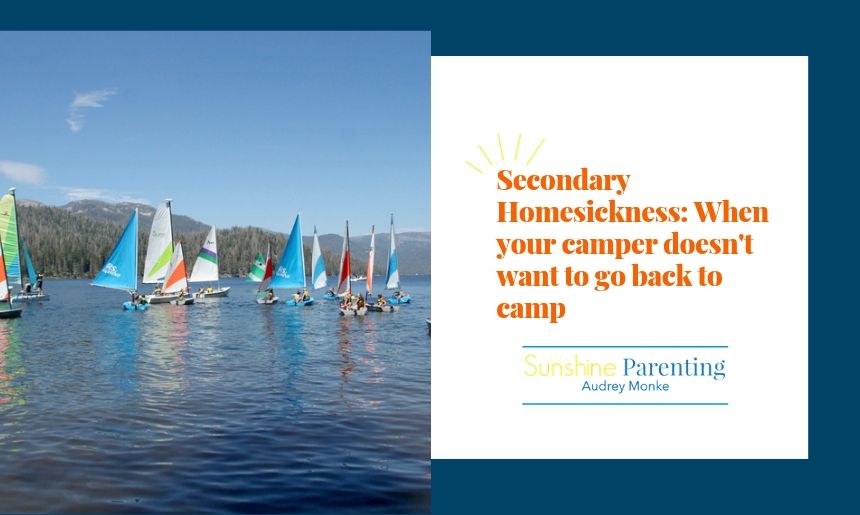“I don’t want to go back!”
Two or three times each year, I get a call from a returning camper’s parent who is baffled that their once-happy camper is now saying she doesn’t want to return to camp. From what the parent saw and heard last summer, camp was a great experience. So why is the child now hesitating to return? If this were your child, what would you say and do in this situation? Should you invest a lot of money in an experience your child is now saying she doesn’t want to do again?
Validating Feelings
On the one hand, we want to honor our kids’ opinions. These days, we all know the importance of validating our children’s feelings and not insisting they do what we want all the time. Yet, there are times when a child’s anxiety may stop him from doing something really great. In these cases, it’s our job to encourage kids with what Dr. Michael Thompson calls “more than one gentle push out of the nest.” If we insulate our children from discomfort, we could prevent them from having some amazing life experiences.
Find the Right Camp “Match”
There are many different types of overnight camps, and if your child is hesitant to return because of the  activities offered or philosophy, encouraging a better fit is a great idea. But I do think it’s worth trying camp again, especially when you know that the experience was largely positive. I contacted Thompson—my favorite homesickness guru and author of Homesick and Happy—to have him weigh in:
activities offered or philosophy, encouraging a better fit is a great idea. But I do think it’s worth trying camp again, especially when you know that the experience was largely positive. I contacted Thompson—my favorite homesickness guru and author of Homesick and Happy—to have him weigh in:
Wise Words from Michael Thompson, Ph.D.
“Let’s call it Secondary Anticipatory Homesickness, where a camper facing a second year of camp keenly remembers and anticipates some psychic pain but is not equally in touch with the pleasures of camp. A parent has to acknowledge that it took courage to go off the first year and will take courage again. A parent has to say, ‘We respected you for what you accomplished last summer, and we’re excited about how you will grow this summer. We know you can do it again and we are really hoping that you do.’ The fledgling needs more than one gentle push out of the nest. Mainly, a child needs an acknowledgment that there was some pain and effort involved and to know that the parents are sure she/he can do it again.”
Thompson calls this encouragement “a second vote of confidence in the child’s strength.” I think for some kids, camp—and other experiences, for that matter—may never be completely comfortable. As a camp director, I’ve met many adults who had one negative camp experience as a child and decided from it that they were not a “camp person.” Amazingly, I also had an incredibly homesick, negative camp experience as an eight-year-old. My mom saved the tear-stained postcards and called the camp to check on me. Yet, a few years later I decided to return to a different camp and had an amazing, life-changing experience. I can relate to the pain kids feel when they reflect on moments (or hours) of homesickness from the previous summer. But I also know that coming back to a place that’s familiar gets easier with practice, and the sense of community and belonging builds with time. They may still experience pain—as all of us do at different times—but they get better at mastering it, and thus come out stronger, more confident people.
Getting Comfortable with Discomfort
As with every other challenge and new experience, going to camp for the first time (or the second, third, or  fourth for more anxious kids) will likely bring discomfort for kids and parents alike. The question is, are you willing to work through the discomfort and help your child face this particular challenge?
fourth for more anxious kids) will likely bring discomfort for kids and parents alike. The question is, are you willing to work through the discomfort and help your child face this particular challenge?
Need some help with wording of why you think returning to camp is important for your child? Read my Messages for an Anxious Camper for some tips!
Related/Resources
Homesick and Happy, Michael Thompson, Ph.D.
Ep. 39: How to Handle Your Camper’s Homesickness
“Kidsickness”: Help for First Time Camp Parents
Should I Make my Kid go to Camp?
What’s the Best Age for Camp?
10 Reasons Great Parents Choose Summer Camp for Their Kids
 More information about Audrey’s new book is here: Happy Campers: 9 Summer Camp Secrets for Raising Kids Who Become Thriving Adults.
More information about Audrey’s new book is here: Happy Campers: 9 Summer Camp Secrets for Raising Kids Who Become Thriving Adults.
In Happy Campers, Audrey shares what she’s learned from three decades of creating a culture where kids become happier while gaining important social and emotional skills. The book is based on her thousands of interactions with campers, camp counselors, and parents, her academic research in positive psychology, and interviews with camp directors from across the country.

